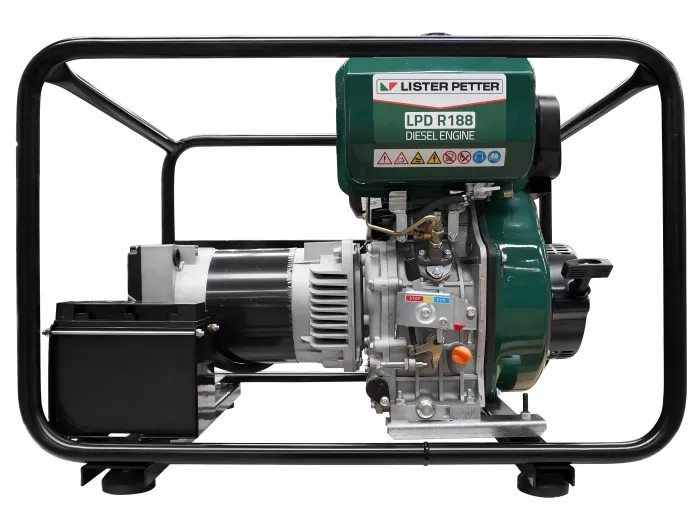Diesel generators have long been a popular choice for providing reliable power in various applications, from industrial operations to residential backup systems. Their widespread use is attributed to several key advantages that diesel fuel offers. This article explores why diesel is often the fuel of choice for generators, focusing on its efficiency, reliability, cost-effectiveness, and suitability for different power needs.
1. Understanding Diesel Generators
1.1 How Diesel Generators Work
Diesel generators convert diesel fuel into electrical power through a series of processes involving a diesel engine and an alternator. The diesel engine burns fuel to create mechanical energy, which drives the alternator to produce electricity.
1.2 Key Components
Diesel Engine: Burns diesel fuel to generate mechanical energy.
Alternator: Converts mechanical energy from the engine into electrical energy.
Fuel System: Includes the fuel tank, pump, and filters to deliver diesel fuel to the engine.
Cooling System: Maintains the engine at an optimal operating temperature.
Control Panel: Allows users to monitor and control the generator’s performance.
2. Efficiency and Performance
2.1 Fuel Efficiency
Diesel engines are known for their fuel efficiency. Diesel fuel has a higher energy density compared to gasoline, meaning that diesel generators can produce more power with less fuel. This efficiency is crucial for reducing operational costs, especially for generators that run for extended periods.
2.2 Longevity
Diesel generators are designed for durability and long-term use. Diesel engines typically have a longer lifespan than gasoline engines due to their robust construction and lower operating temperatures. This longevity makes diesel generators a reliable choice for critical applications where continuous power is essential.
2.3 Power Output
Diesel generators are capable of delivering high power outputs, making them suitable for both small-scale and large-scale applications. Whether it’s powering a home during an outage or providing electricity for industrial operations, diesel generators can handle varying power demands effectively.
3. Cost-Effectiveness
3.1 Fuel Costs
While diesel fuel may be more expensive than gasoline on a per-gallon basis, diesel generators are more fuel-efficient, resulting in lower fuel consumption over time. This efficiency can lead to cost savings in the long run, particularly for applications requiring continuous operation.
3.2 Maintenance Costs
Diesel generators generally have higher maintenance requirements compared to gasoline generators. However, the durability and reliability of diesel engines often result in fewer breakdowns and repairs, potentially reducing overall maintenance costs. Regular servicing and proper maintenance can further enhance the cost-effectiveness of diesel generators.
4. Reliability and Durability
4.1 Dependability
Diesel generators are renowned for their reliability. They are built to withstand harsh conditions and continue operating efficiently under stress. This reliability is essential for applications where power outages can have significant consequences, such as in hospitals, data centers, and manufacturing facilities.
4.2 Robust Construction
Diesel engines are designed to handle heavy loads and operate for extended periods. Their robust construction ensures they can endure demanding environments and frequent use without compromising performance. This durability makes diesel generators a preferred choice for both temporary and permanent power solutions.
5. Environmental Considerations
5.1 Emissions
Modern diesel generators are equipped with advanced emission control technologies to reduce pollutants. These technologies include diesel particulate filters (DPF) and selective catalytic reduction (SCR) systems, which help minimize the environmental impact of diesel generators. Despite concerns about diesel emissions, advancements in technology have made diesel generators more environmentally friendly.
5.2 Fuel Storage
Diesel fuel is stable and has a longer shelf life compared to gasoline. This stability is advantageous for fuel storage, especially in situations where generators are used infrequently or stored for extended periods. Proper fuel storage practices can help maintain fuel quality and ensure the generator’s reliability when needed.
6. Applications of Diesel Generators
6.1 Industrial Use
Diesel generators are widely used in industrial applications due to their ability to provide high power outputs and operate continuously. They are essential for powering machinery, equipment, and backup systems in factories, construction sites, and mining operations.
6.2 Residential Use
For residential applications, diesel generators offer a reliable backup power solution during outages. They can power essential appliances and systems, ensuring comfort and safety during emergencies.
6.3 Commercial Use
Businesses and commercial establishments often use diesel generators to ensure uninterrupted power supply. They are commonly employed in offices, retail stores, and restaurants to prevent disruptions and maintain operations.
see also: Diesel or Gas Generator: Which Is Better
7. Challenges and Considerations
7.1 Noise Levels
Diesel generators can be noisy, which may be a concern for residential and commercial settings. However, modern generators are equipped with noise-reducing features and enclosures to minimize sound levels and improve user comfort.
7.2 Fuel Management
Proper fuel management is crucial for the efficient operation of diesel generators. Regular monitoring of fuel levels, quality, and storage conditions can help prevent issues and ensure the generator’s reliability.
7.3 Environmental Regulations
Compliance with environmental regulations is essential for diesel generator operation. Users should be aware of local regulations regarding emissions and fuel usage to ensure their generators meet legal requirements.
Conclusion
Diesel generators remain a popular choice for various applications due to their efficiency, reliability, and cost-effectiveness. Their ability to provide high power outputs, coupled with their durability and robust construction, makes them a preferred option for industrial, commercial, and residential use. While diesel generators do have some challenges, such as noise levels and environmental considerations, advancements in technology have addressed many of these concerns. As a result, diesel generators continue to be a valuable and dependable solution for meeting diverse power needs.
Related topics:
- What Is the Smallest Diesel Generator?
- Top 4 Quietest Diesel Generator
- How Efficient Are Diesel Generators?

